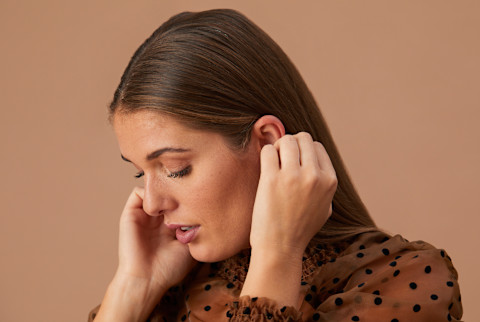Studies Show Hair Loss Is More Common Right Now — Here's Why & What To Do

Many women I have spoken to about their beauty routines this year have expressed one growing concern: Why am I shedding so much more hair recently—am I, gasp, losing more hair? An uptick in shedding can be a distressing thing for many, as ideally we'd like to grow luscious, healthy hair, not see it on our brushes, combs, or circling down the drain.
At first, I thought I could pin it on the fact that since we're all staying home more—with less to distract ourselves with—we may pick up on things that have always been there. One of my cardinal rules for beauty: When you go looking for problems, you'll find them.
And hair shedding could certainly be one of those things. When we are out and about our hair loss is spread throughout the day in many locations (a few strands are lost on a walk, in a car, while fidgeting with your hair after a workout class, or a few at the office), so we likely don't notice it. But when we are at home far more frequently, we are likely picking up on those hairs, since they're collecting in one area.
But as time went on, these complaints did not let up. And thus, anecdotal information became science-backed. Yes, research, studies, surveys, and experts agree: Increased hair shedding (and even loss) is more common right now.
Hair shedding is likely increased right now: What the science says.
We know that hair loss can be a side effect of extreme stress. It's even a medical condition known as telogen effluvium. The stress pushes the follicles into a dormant phase (known as the telogen phase), which can cause those hairs to fall out.
It happens because our hair is super sensitive to any kind of imbalance in our bodies, due to how fast those strands reproduce. So when our hormone regulators—specifically, our sympathetic nervous system and adrenal glands1—are imbalanced (like, say, due to a pandemic), our hair is one of the first things to take a hit. "Both of these hormone [regulators], if out of balance due to high stress, will create hair thinning and loss," certified trichologist Penny James reminds us about hair loss in women.
And all the recent survey findings suggest that this is happening to men and women across the country: According to a recent survey of around 1,000 adults, nearly 2 in 5 of us have experienced hair loss as a result of quarantine-induced stress.
It may even be a symptom of COVID-19, according to some reports. In fact, a survey of 3,900 COVID-19 survivors done by Survivor Corps, a COVID-19 survivor support group, found that 32% of respondents reported hair loss. However, the researchers aren't able to conclude whether it's an actual side effect of the virus or simply as a result of going through stress associated with the virus. Read: There's a connection there, but it's not clear if it's correlation or causation.
Hair experts agree: Famed hair restoration specialist Lars Skjoth, Ph.D., lead researcher and founder of hair care brand Harklinikken, recently told us about seasonal shedding, "Certain people have been suffering from much more shedding because there's been so much stress for so many people for so long. I truly believe COVID-19 and quarantine have been exacerbating the symptoms of hair loss dramatically."
"Hair health and wellness" products have seen an uptick in sales, as well as search volume, according to the beauty site Glossy. They even reported that this summer, year-over-year searches for "hair loss" on Sephora's site rose by 409%, while searches for hair-loss treatment ingredient biotin rose by 291% in the same time period on Ulta.
What can you do about it?
Here's the good news: Hair lost due to stress eventually grows back with time. If you'd like to help support your regrowth with adequate measures, you can also incorporate a hair-healthy supplement into your routine to help.
Collagen and biotin supplements are two of the most famous options for hair health. Collagen supplements are made of hydrolyzed collagen peptides—which are basically just short-chain amino acids.* Amino acids are the building blocks of keratin, the protein that makes up your hair. By supplying your body with adequate nutrients, you encourage scalp health and ideally overall hair health.*
Biotin, a form of vitamin B, has several strong hair health claims. (Actually, thinning hair and hair loss are very common symptoms of biotin deficiency2 and can be supported with a supplement.*) See, it is believed to naturally promote healthy hair growth because it is also involved in the production of keratin.* In one small study, women with thinning hair reported significant regrowth when supplementing with biotin as compared to those given a placebo.*
You can also consider adding antioxidants—like vitamins C and E—to help manage oxidative stress.* Oxidative stress happens as a result of chronic inflammation and wreaks havoc on the body, hair loss included (stress is a very common trigger for chronic inflammation). So by helping neutralize the free radical damage associated with oxidative stress, you may be able to prevent some of its side effects.*
The takeaway.
If you are (or have in the last few months) gone through a bout of hair loss—you are not alone. In fact, all the recent research, surveys, and experts agree that this isn't just some simple anecdotal phenomenon: Many of us are going through it.
Rest assured that your hair growth will likely go back to normal—but you can also incorporate a healthy hair supplement, like mindbodygreen's grass-fed collagen+, to help.*

